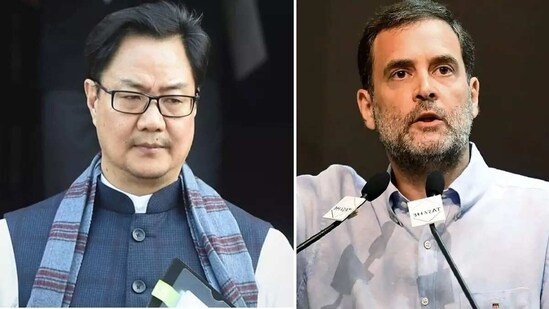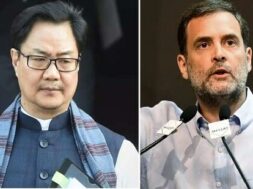
BJP Slams Congress for “Inviting” Foreign Powers to Interfere into India’s Internal Affairs
Manas Dasgupta
NEW DELHI, Mar 30: The Congress has distanced itself from the former Madhya Pradesh chief minister Digvijaya Singh’s statement thanking the German government which followed the United States to express concern over Rahul Gandhi’s prison sentence followed by his disqualification forcing the BJP to lash out at the Congress for “giving an open invitation” to foreign powers to interfere into the internal affairs of India.
Digvijaya Singh’s tweet thanking Germany’s foreign ministry for taking note of Rahul Gandhi’s suspension from the Lok Sabha followed the Germany Foreign Ministry spokesperson saying at a press briefing on Thursday that Berlin had “taken note” of the verdict, and was watching the next steps, including his ability to appeal the verdict and whether the “suspension of his mandate” was justified. “[Germany] expects that standards of judicial independence and fundamental democratic principles will equally apply to the proceedings against Rahul Gandhi,” the spokesperson added.
The BJP leaders and union ministers slammed Singh over the tweet, calling it an open attempt to invite foreign powers to interfere in India’s internal matters. Union Minister Kiren Rijiju and Anurag Thakur slammed Gandhi in tweets, repeating the allegation that Gandhi seeks foreign intervention in domestic affairs.
The Congress has rubbished the charge, challenging the BJP to produce examples of Gandhi requesting such an intervention. Gandhi has only been speaking about the state of affairs in India in his engagements abroad and not asking for help, his party has said.
The Congress leader Jairam Ramesh, who is in charge of the party’s communications, said the country’s political problems should be solved from within, amid attacks by the BJP for allegedly trying to drag in foreign powers to influence India’s internal matters.
“Congress firmly believes that India’s democratic processes themselves have to deal with the threats posed to our democracy by Mr Modi’s assault on our institutions and his politics of vendetta, intimidation, threats and harassment. Congress and opposition parties will take him on fearlessly,” Ramesh tweeted, without directly mentioning Singh’s comment that had led to a huge controversy.
Earlier this week, the US government had also commented on the Rahul Gandhi case with the State Department spokesperson calling “respect for the rule of law and judicial independence as a cornerstone of any democracy”. “We’re watching Mr. Gandhi’s case in Indian courts, and we engage with the Government of India on our shared commitment to democratic values – including, of course, freedom of expression,” the spokesperson Vedant Patel had said on March 27.
To a specific follow-up question, he didn’t confirm or deny that the US government was directly in contact with the Congress party, but added that it was “normal and standard” for the US government to engage political opposition parties as a part of bilateral ties.
Congress leader Digvijay Singh welcomed the German statement saying it took note of what he claimed was “democracy being compromised in India through the persecution” of Gandhi.
In response, the BJP’s Foreign Affairs Department In-Charge Vijay Chauthaiwale said it showed how “desperate [Congress party is] to involve external agencies in the domestic matters” and Law Minister Kiren Rijiju criticised Mr. Gandhi for “inviting foreign powers for interference into India’s internal matters,” adding that India “won’t tolerate ‘foreign influence’ anymore”. In another interview in Bangalore this week, referring to Gandhi, the external affairs minister S. Jaishankar said “people from inside this country are taking politics outside, and people from outside are interfering in politics inside.”
As Germany weighed into the debate over the Rahul Gandhi defamation case, both the ruling BJP and the Congress exchanged words, further fuelling the debate over whether the Modi government faces a concerted attack by governments in the west.
A growing number of statements this year by the government indicated it felt there was a larger “conspiracy” to the international concern and criticism over India’s internal issues, as a trend rather than a single issue at hand. Jaishankar had earlier referred to the BBC Documentary on PM Modi, as part of an international politically timed agenda. Whether or not “election season has started in India, Delhi or not, but for sure it has started in London, New York,” he said.
After the Indian high commissions were targeted on the Khalistan issue and vandalised some temples and Indian community centres in some countries, the MEA had summoned top diplomats of four ‘western’ countries, including Switzerland, U.K., U.S. and Canada, and the Prime Minister Narendra Modi took up the issue with a fifth, Australian PM Albanese during a visit to Delhi.
The accelerated responses lead to the conclusion that the government is raising the stakes on the challenge it perceives from “indifference” or complicity in the West, in events constituting “internal affairs”. “It is time we are clear about who we are and the stand we take and if these things happen there will be consequences,” Jaishankar said at yet another interview on Wednesday.
The Ministry of External Affairs didn’t react to either the German or US statement immediately, understood to be for a number of reasons. To begin with, apart from the public statements both Berlin and Washington has said discussions over Indian democracy already take place behind closed doors, and the government has dealt with them. Secondly, a war of words would be unseemly ahead of many high-level meetings between Modi and leaders of the countries coming up.
While the German chancellor Olaf Scholz has already visited Delhi in February for a summit and will return for the G-20, Modi is expected to meet with US President Joseph Biden four times in the next few months- at the G-7 outreach in Hiroshima and Quad summit in Sydney in May, in Washington where Modi will receive State honours in June and in September when Biden comes to Delhi for the G-20 summit as well. Joining issue at this point would only bring more publicity to internal Indian processes, officials said, adding that the government would still respond, if the need arose.













